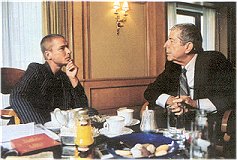Focus: Your extensive literary works fade behind your reputation as a gentle ladies' man and a gloomy popsinger with millions of albums sold. Does that trouble you?
LC: No, no longer. I am very content to have found an audience. There were times in which it seemed to me that all my efforts were futile.
Focus: What induced you at the end of the 60's, after being a distinguished poet and having written novels, to enter the folk and pop world?
LC: I was under a great deal of financial pressure. I saw that as a writer I would not be able to sustain my existence. The funds from my published novels were not sufficient to satisfy my most fundamental needs. In its first year, Beautiful Losers sold only 3000 copies worldwide. I was living on the Greek island of Hydra, where I had bought a house, when I returned to New York I discovered that a folk-scene had developed with leading figures such as Joan Baez, Judy Collins and Bob Dylan. I thought I might be able to take part. I knew a few chords on the guitar. Obviously, I rushed into that scene at the right moment.
Focus: About your debut album Songs of Leonard Cohen, 1968, the New York Times at the time wrote with more sarcasm than enthusiasm: "It ranks on the alienation scale somewhere between Schopenhauer and Dylan. Dylan is aliented from the world and furious about it, whereas Cohen is alienated from the world and sad about it."
LC: There were long periods in my life that I suffered with depression. I fought this darkness of the soul with all resources that I felt were available. I tried to defeat it with religion, drugs, art, drinking and women. I tried all possible conventional therapies. The success was mostly modest. But recently I read in a medical journal something that cheered me: with the aging process the brain cells responsible for anxiety and fear gradually die off. This, I think, is a very helpful and sensible evolution. Slowly, I profit from it.
Focus: You seem to allow yourself a generous amount of time to complete your musical and literary work. Is this slowness your basic life philosophy?
LC: No, it is more a disagreeable necessity. I would prefer to write my songs quickly and efficiently. We all want to be fast and efficient, and then we discover that we are slow and average. What a disappointment! For a song to open itself to me presupposes a great force of effort that exceeds all reasonable measure. "Alexandra Leaving," one of the songs on my new album, I began on Hydra in 1985. The first drafts disappeared into a desk drawer until I discovered them and began working on them again in the late nineties. In the spring of this year the song was ready, from the innumerable original verses only nine remained.
Focus: Does the seriousness of your songs and their links to tradition and Jewish religious law preclude them from being accepted by the pop audience looking for light and pleasant songs?
 |
| Leonard with Sven F. Goergens |
LC: There are aspects of Judaism that are extraordinary playful and cheerful. I do not view my religion as restraining or binding. We participate in the directions of daily life because we regard them as the law of G-d. Therefore, their fulfillment gives us much pleasure. Some of my melodies are based on Hebrew songs, which I sang as a child in the synagogue. There are chords which can be both cheerful and urgent. But I require a quantity of alcohol in order to ease the transfer of these aspects to my music or my stage appearances. On one of the last tours, we had a fantastic red wine. Château Latour, 1982, an ideal complement to the pace of my melodies. Unfortunately it was rather expensive, almost 400 Marks per bottle. After the tour ended, I tried the wine one more time. But it no longer possessed the same power. The wine needed my volumes of music for its development and vice versa.
Focus: Do you remember when you used to release albums without many accompanying musicians?
LC: In very early times, I tried that. But in the meantime, my music became much more complex. Furthermore, I would bore myself to death to be in the studio or on stage alone. Sharon Robinson, who has worked with me since 1979 as a backup singer and who produced the new album, has succeeded in cushioning the imperfections of my voice. When we sing together, my voice contains no loneliness.
Focus: Your voice range has expanded, but nevertheless decreased in volume...
LC: I haven't visited any voice teacher. But I decided not to give up smoking.
Focus: You once described your conditions this way: "A pessimist is someone who waits for the rain. But I am already soaked to the skin." As someone who hopelessly suffers from melancholy, does the thought of death frighten you?
LC: No, only the possibility of illness and physical disabilities makes me anxious. Tennessee Williams commented rightfully so, "Life is a fairly well-written play except for the third act." But that last act is miserable.
|
|
|
|
|